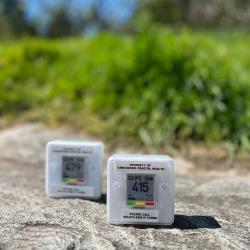Air quality
From traffic pollution in cities to wildfire smoke inside our homes, air pollution poses a threat to health. Learn ways to reduce air pollution in your community and keep your indoor air clean.

How air quality impacts health
We should reduce exposures to air pollution as much as we can. The impact of air pollution on an individual will depend on factors including the type and amount of air pollution they are exposed to, how long they are exposed, and their pre-existing health conditions and age.
Health impacts from exposure to certain air pollutants can include:
- Headache and eye, nose and throat irritation
- Asthma onset and exacerbations
- Respiratory infections
- Lung cancer
- Stroke
- Heart disease
- Death
Recent studies have found that exposure to certain air pollutants may also be linked to reduced lung function, pre-term birth, low birth weight, cognitive development, mental health outcomes, dementia, and diabetes.

Health Canada estimates that outdoor air pollution contributes to 1,900 premature deaths per year in British Columbia, in addition to almost 300,000 days of asthma symptoms and 4 million days of acute respiratory symptoms among British Columbians. The total economic cost of all health impacts attributable to air pollution in BC is $14 billion per year (2016 estimates).

People most at risk of health impacts from air pollutants
Some people are more exposed to air pollution, such as people who live, work, or spend time near busy roads or industrial areas, as well as people in regions where wood-burning stoves or fireplaces are used.
Certain groups of people may also be more at risk for health effects from exposure to air pollution for medical reasons.
This includes:
- People with pre-existing chronic conditions such as asthma, chronic obstructive pulmonary disease (COPD), heart disease, and diabetes
- People who are pregnant
- Infants and small children
- Older adults
- People with a current or recent respiratory infection
Infants and small children are especially susceptible to air pollution exposures for reasons including:
- Children’s lungs, other organs, and immune systems are developing rapidly, and air pollution may affect these processes.
- Children take in more air pollution because they breathe faster and inhale more air relative to body size than adults.
- Children take in more air pollution because they are generally more physically active than adults.
Other people can be affected by air quality, too. Everyone responds differently, so listen to your body and reduce your exposure if the air quality is affecting you.
Learn more about air quality
-

Air quality concerns
Vancouver Coastal Health provides information and advice to help prevent and ad…
-

Outdoor air quality
Outdoor air pollution can come in many different forms. In addition to regional…
-

Indoor air quality
Canadians spend an average of 90% of their time indoors, so our indoor environm…
-

Air quality monitoring projects
Here you will find information on Vancouver Coastal Health’s ongoing air qualit…
-

Environmental health resources for schools and childcare facilities
We have downloadable materials on extreme heat, wildfire smoke, traffic polluti…
-

Radon
Radon is the second leading cause of lung cancer in Canada after tobacco smokin…

Featured
Wildfire smoke
Wildfire smoke events are becoming more frequent and severe as the climate changes, resulting in more days with poor air quality that can impact health. Wildfire smoke is a form of air pollution made of small particles and many gases, which can affect your health.



